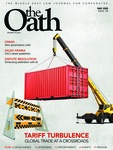Iran reconnected to SWIFT

Iran’s Central Bank and 15 other Iranian banks have now been reconnected to SWIFT. In a statement, the Central Bank confirmed that “The on-boarding process including administrative and technical measures for all non-sanctioned Iranian banks including the Central Bank of the Islamic Republic of Iran is now completed.”
Whilst those banks not covered by the remaining sanctions have been connected, including the Central Bank, some of the banks' foreign subsidiaries and branches are still working with Swift to gain access.
Whilst reconnection to the SWIFT network marks progress in Iran re-entering the international market, it is yet to be seen how quickly international banks will agree to enter into Swift relationships with Iranian banks. In particular, US primary sanctions remain in place to prevent any US bank or financial institution from dealing with Iran directly or indirectly, and US dollar transactions remain restricted. The European banks are seemingly cautious although it is understood that German, French, British and Italian banks are in talks to open up in Iran and are working towards on a case by case basis to open up Swift relationships.
The use of dollars
It is well documented that Iranian transactions are not to be carried out in US dollars. It is important to understand, however, that dollar payments themselves are not prohibited per se. The use is restricted due to a practical problem arising from the US primary sanctions which continue to apply to US banks. Whilst US dollar payments are generally cleared through the US banking system, the primary sanctions apply to oblige US banks to stop and hold any money relating to Iranian transactions. The banks therefore employ sophisticated OFAC software to detect Iranian transactions. Any payment in dollars related to Iran runs the risk of being refused clearance and held by the US banks.
Whilst dollar transactions are generally cleared in New York, not all are. It is understood from the Central Bank of Iran that Hong Kong still has a dollar clearing mechanism which does not touch the US.
It is suggested that those wishing to use dollars in relation to Iranian transactions consult with their banks to assess whether dollar transactions can be cleared in a way which keeps the payments outside of the US system.
Commentary by Rovine Chandrasekera and Joanne Lewis of Stephenson Harwood

























































































































